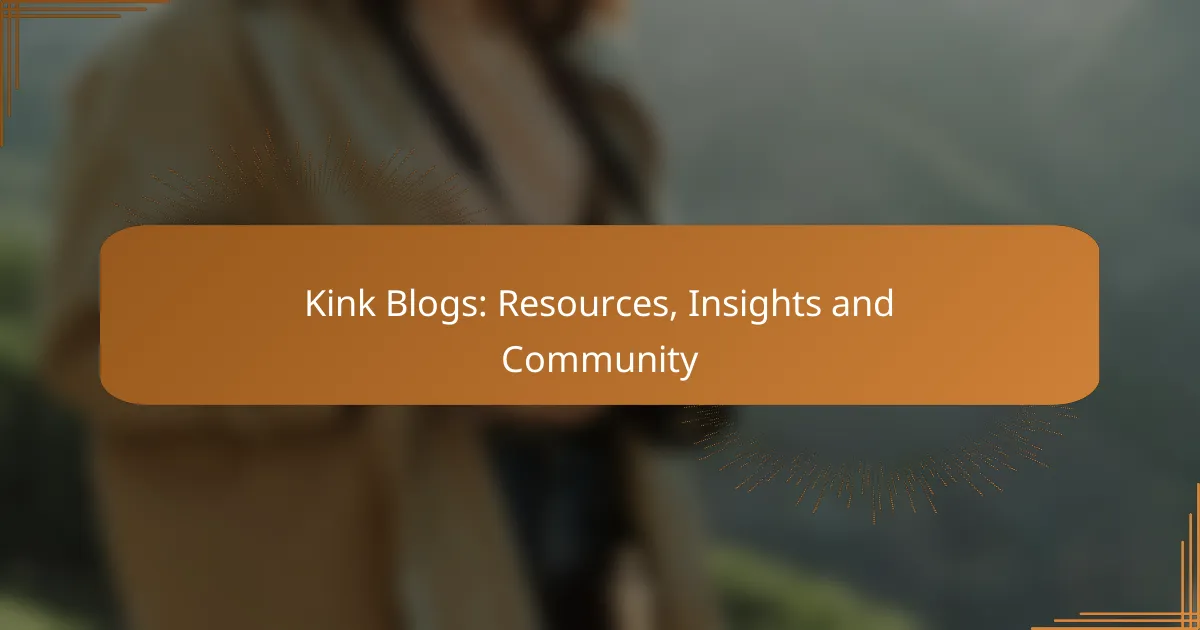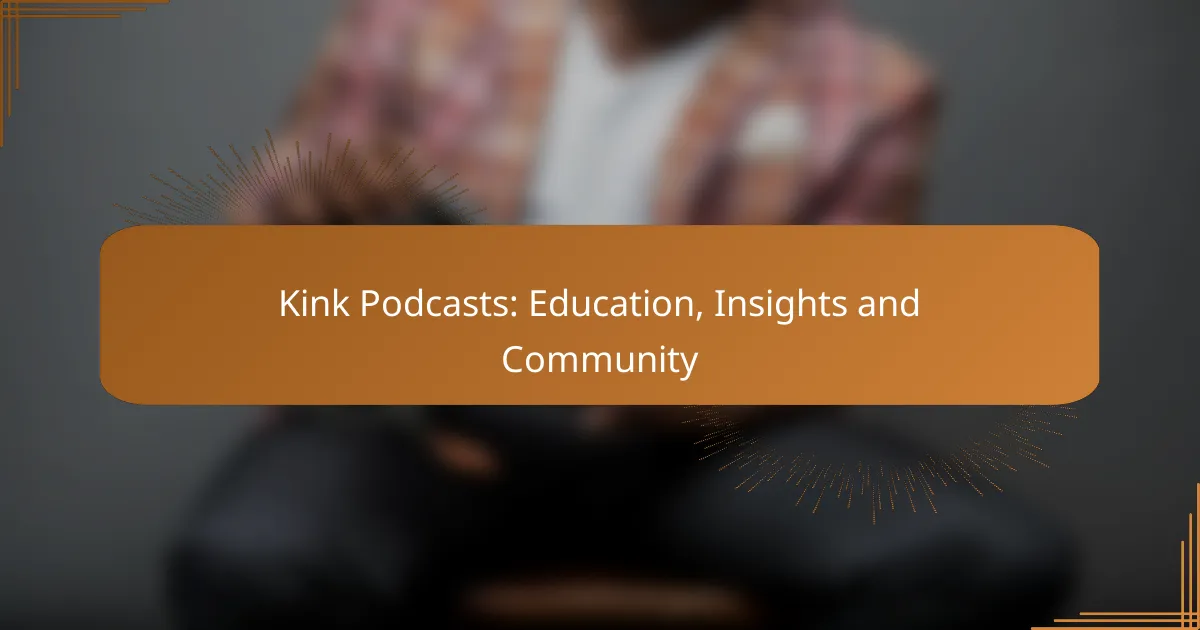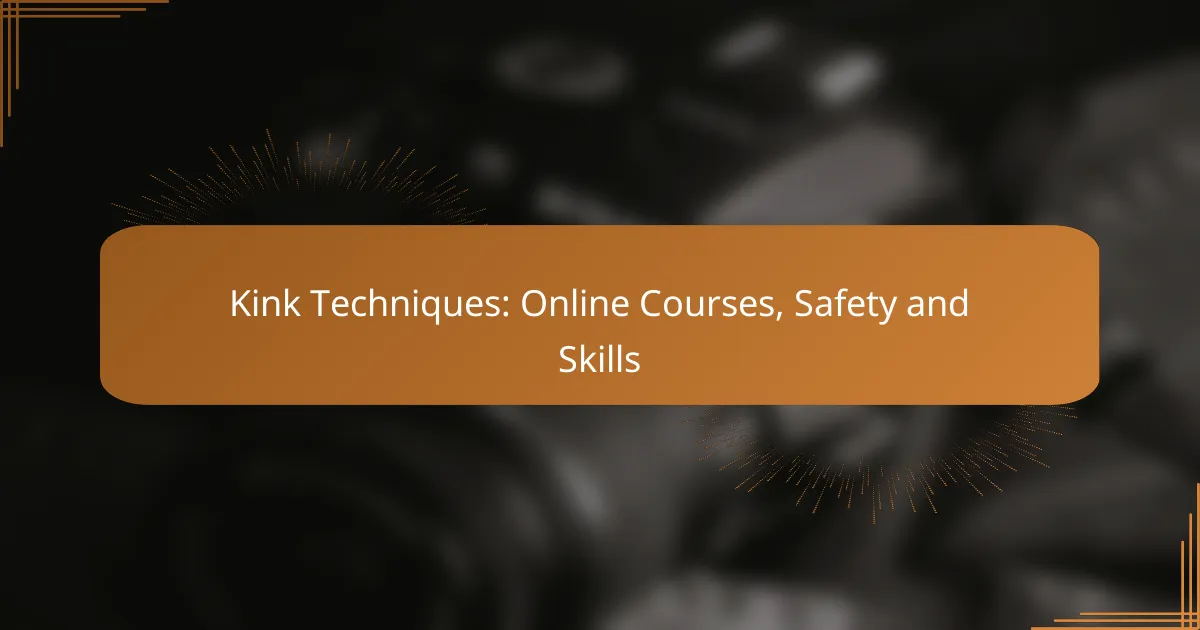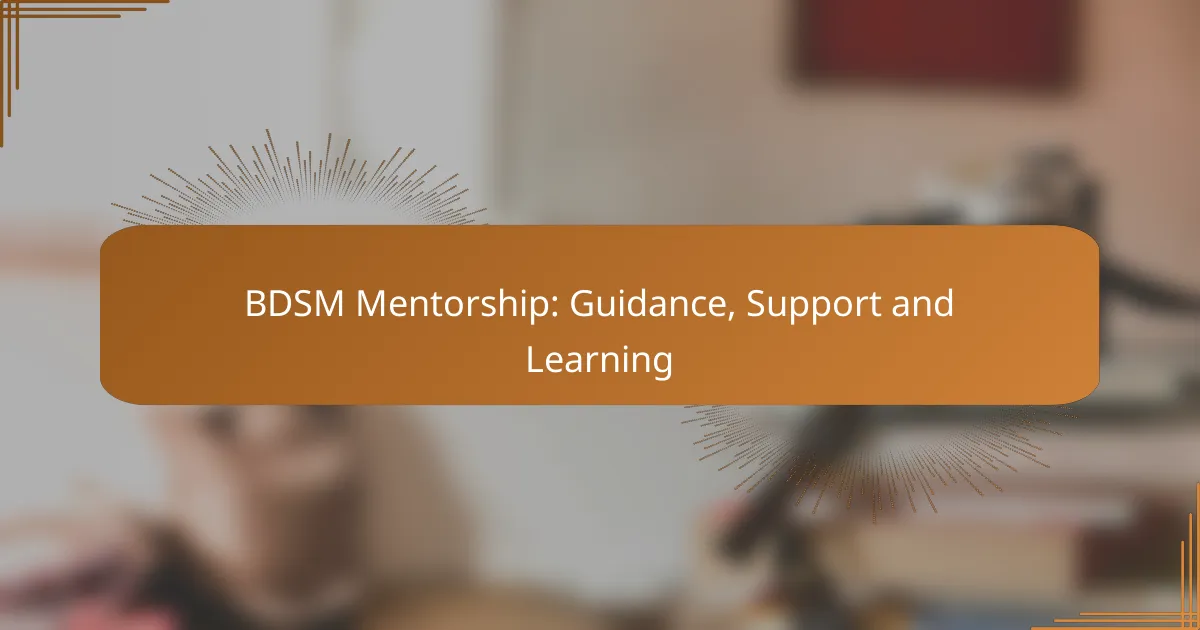Kink blogs serve as vital resources for individuals seeking connection and support within the kink community. They offer a wealth of insights, personal experiences, and practical advice, helping readers navigate their interests while fostering a sense of belonging. Whether you’re new to kink or looking to deepen your understanding, these blogs provide essential information and a welcoming space for discussion.
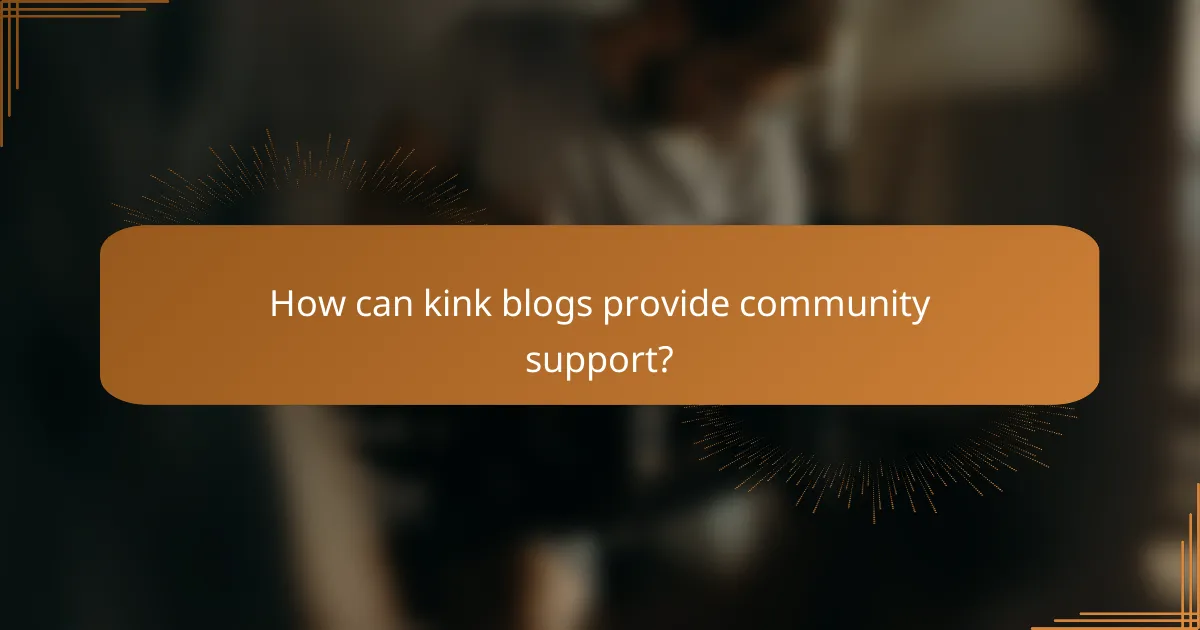
How can kink blogs provide community support?
Kink blogs offer a platform for individuals to connect, share experiences, and find support within the kink community. They facilitate discussions, provide resources, and help individuals feel less isolated in their interests.
Online forums for discussion
Online forums dedicated to kink topics allow users to engage in discussions, ask questions, and share insights. These platforms often feature threads on various subjects, from safety practices to personal experiences, fostering a sense of belonging.
When participating in forums, consider the tone and rules of each community. Some forums may have strict guidelines about content and behavior, so familiarize yourself with them to avoid misunderstandings.
Local meetups and events
Local meetups and events provide opportunities for individuals to connect face-to-face, building stronger community ties. These gatherings can range from casual coffee meetups to organized workshops or parties, often advertised through kink blogs and social media.
To find local events, check community calendars or specific kink blogs that focus on regional activities. Always prioritize safety by meeting in public spaces initially and ensuring that events are hosted by reputable individuals or organizations.
Social media groups
Social media groups focused on kink topics create virtual spaces for members to share resources, ask questions, and support one another. Platforms like Facebook and Reddit host numerous groups where people can discuss their interests and experiences.
When joining social media groups, be mindful of privacy settings and group rules. Engaging respectfully and sharing relevant content can enhance your experience and help build connections with others in the community.
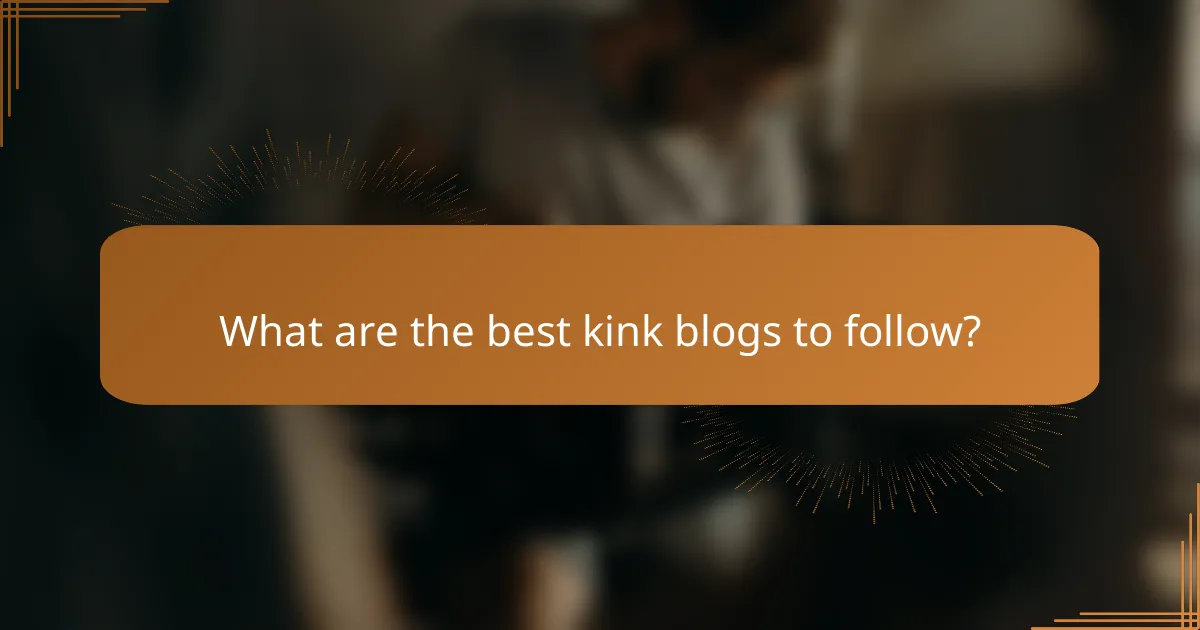
What are the best kink blogs to follow?
The best kink blogs to follow provide valuable insights, resources, and community connections for individuals interested in kink. These blogs cover a range of topics, from personal experiences to practical advice, making them essential for anyone looking to explore or deepen their understanding of kink.
Fetlife blog
The Fetlife blog is an extension of the popular social networking site for kinksters, Fetlife. It features user-generated content, including personal stories, advice columns, and discussions on various kink-related topics. This blog is particularly useful for those seeking a community-driven perspective on [censured] and alternative lifestyles.
Users can engage with posts by commenting and sharing their own experiences, fostering a sense of belonging. Be mindful of the site’s privacy settings and community guidelines to ensure a safe and respectful environment.
kinkly.com
Kinkly.com is a comprehensive resource for all things kink, offering articles, guides, and expert advice on a wide variety of topics. The blog covers everything from [censured] techniques to relationship dynamics, making it a go-to source for both newcomers and seasoned practitioners. Its well-researched content is designed to educate and empower readers.
Additionally, Kinkly features a glossary of terms and a directory of kink-friendly events, which can help users connect with others in their area. Regularly checking the site can keep you updated on new trends and discussions in the kink community.
Submissive Guide
The Submissive Guide focuses specifically on the experiences and insights of submissives in the [censured] community. It offers a wealth of information on topics such as negotiation, self-discovery, and the dynamics of power exchange. This blog is particularly beneficial for those identifying as submissives or those interested in understanding this role better.
Readers can find practical tips, personal anecdotes, and resources for navigating relationships within the kink framework. Engaging with the content can help deepen your understanding of submission and enhance your experiences in the lifestyle.

How to create a successful kink blog?
Creating a successful kink blog involves selecting a specific niche, producing engaging content, and effectively monetizing your efforts. Focus on authenticity and community engagement to build a loyal readership.
Choosing a niche
Selecting a niche is crucial for your kink blog’s success. Consider areas within the kink community that resonate with you, such as [censured], fetish fashion, or relationship dynamics. A well-defined niche helps attract a targeted audience.
Research existing blogs to identify gaps in content or unique angles you can explore. For example, if [censured] is your focus, you might delve into specific practices, safety tips, or personal experiences that aren’t widely covered.
Content creation strategies
Effective content creation involves a mix of informative articles, personal stories, and community engagement. Aim for a consistent posting schedule, whether it’s weekly or bi-weekly, to keep your audience engaged.
Utilize various formats like blog posts, videos, and podcasts to cater to different preferences. Incorporating visuals, such as images or infographics, can enhance your posts and make them more shareable.
Monetization through advertising
Monetizing your kink blog can be achieved through various advertising strategies. Consider affiliate marketing, where you promote products related to your niche and earn a commission on sales generated through your links.
Additionally, you can explore sponsored content opportunities with brands that align with your blog’s values. Ensure that any advertisements are relevant and resonate with your audience to maintain trust and engagement.

What resources are available for kink education?
Various resources exist for kink education, including books, workshops, and online courses. These tools can help individuals explore [censured] practices safely and consensually while building a supportive community.
Books on [censured] practices
Books provide foundational knowledge about [censured] practices, covering topics from safety and consent to specific techniques. Popular titles include “The New Topping Book” and “The New Bottoming Book,” which offer insights into the dynamics of power exchange.
When selecting books, consider your interests and experience level. Look for resources that emphasize safe practices and consent, as these are crucial in kink education.
Workshops and classes
Workshops and classes offer hands-on learning opportunities in a structured environment. Many local sex shops or community centers host events that cover various aspects of [censured], including [censured] techniques and negotiation skills.
Check local listings or online platforms to find workshops in your area. Participating in these classes can help you connect with like-minded individuals and gain practical experience.
Online courses
Online courses provide flexibility for those interested in kink education. Platforms like FetLife or specialized websites offer a range of courses, from beginner to advanced levels, often taught by experienced practitioners.
When choosing an online course, look for those that include interactive elements, such as forums or live Q&A sessions, to enhance your learning experience. Ensure the course content aligns with your personal goals and interests in kink.
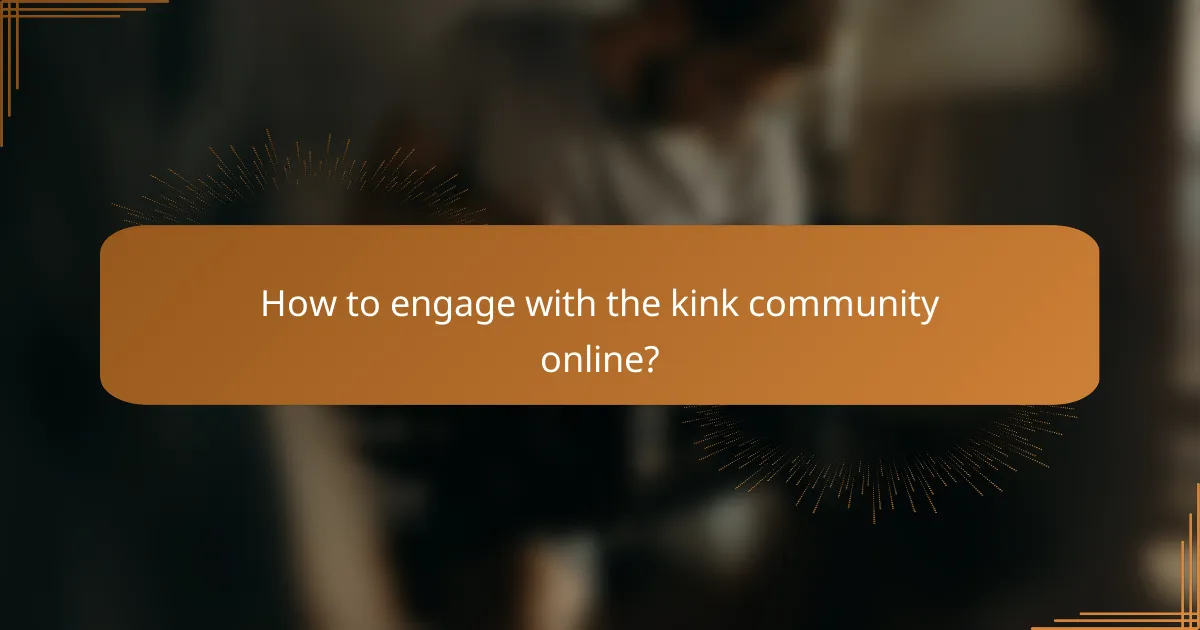
How to engage with the kink community online?
Engaging with the kink community online involves actively participating in discussions, sharing your personal experiences, and collaborating with other bloggers. These interactions can help you build connections, gain insights, and contribute to a supportive environment.
Participating in discussions
Joining online forums, social media groups, and dedicated kink websites is a great way to participate in discussions. Look for platforms that focus on your specific interests within the kink community, such as [censured], fetish, or [censured]. Engaging respectfully and thoughtfully will encourage others to share their perspectives.
When participating, consider using open-ended questions to foster deeper conversations. Avoid dominating discussions; instead, aim to listen and respond to others’ experiences and insights. This approach helps create a welcoming atmosphere for all members.
Sharing personal experiences
Sharing your personal experiences can provide valuable insights to others in the kink community. Write blog posts or contribute to forums detailing your journey, lessons learned, and any challenges faced. Authenticity resonates well, so be honest about your experiences while respecting the privacy of others involved.
Consider using a pseudonym if you want to maintain anonymity. This can help you feel more comfortable sharing sensitive topics while still contributing to the community. Remember to encourage feedback and discussions around your posts to enhance engagement.
Collaborating with other bloggers
Collaborating with other bloggers can amplify your reach and enrich your content. Look for bloggers who share similar interests or values and propose joint projects, such as guest posts or co-hosted events. This not only diversifies your content but also introduces you to new audiences.
When collaborating, establish clear communication and set mutual goals for the partnership. Be open to feedback and flexible in your approach to ensure a successful collaboration. This can lead to lasting relationships within the kink community and enhance your understanding of various perspectives.
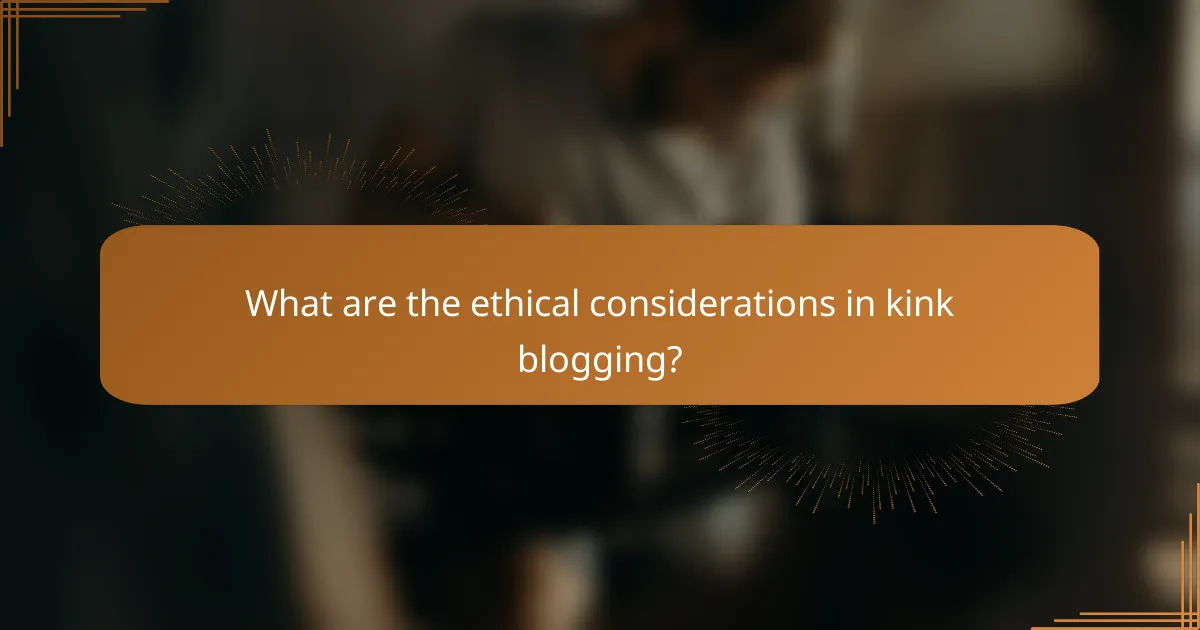
What are the ethical considerations in kink blogging?
Ethical considerations in kink blogging revolve around consent, privacy, and the potential impact on individuals and communities. Bloggers must navigate these issues carefully to foster a respectful and safe environment for all participants.
Consent in content sharing
Consent is paramount in kink blogging, as it ensures that all individuals involved are comfortable with how their stories and experiences are shared. Always seek explicit permission before using someone else’s experiences or images, even if they are anonymized.
When discussing personal experiences, consider using pseudonyms or altering details to protect identities. This practice not only respects individuals’ privacy but also enhances the authenticity of shared narratives.
Privacy and anonymity
Maintaining privacy and anonymity is crucial in kink blogging, as many participants may prefer to keep their identities confidential. Bloggers should use secure platforms and settings that allow for anonymity, ensuring that personal information is not inadvertently disclosed.
Consider the implications of sharing location-specific details or identifiable characteristics. Avoid revealing sensitive information that could lead to unwanted exposure or harassment, and always prioritize the safety of both yourself and your audience.
